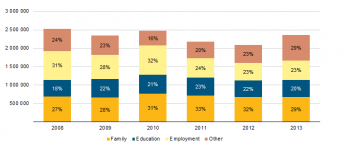Eurostat Statistics Explained: Residence permits statistics, Data from October 2014, 23 Οκτωβρίου.
This article presents European Union (EU) statistics on first residence permits issued to non-EU citizens. Data are based on the regulatory framework of the Article 6 of the Regulation 862/2007 on migration and international protection statistics.
Residence permit represents an authorization issued by the competent authorities of a country allowing third-country national (non-EU citizens) to stay legally on its territory. Data on residence permits are collected by reasons for issuing such permit. The main such reasons are: education, family, employment and other reasons (including stay without right to work, international protection, etc.). Among the main categories of reasons specific categories of reasons are distinguished (e.g. students, researchers, highly-skilled workers etc.). National administrative registers and databases are the main sources for these statistics, with the exception of the United Kingdom [1].
The evolution of residence permits at the country level reflects the national migration’s systems diversity and the influence of European immigration policy. Other factors such as: characteristics of third-country nationals, legal framework and characteristics of countries involved in the immigration process like the geographical proximity or language ties can be also important.





